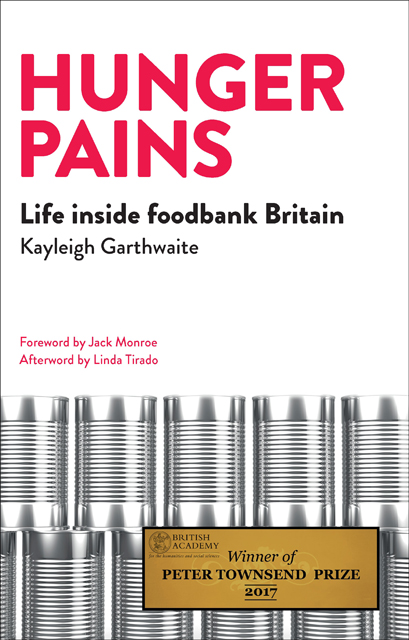Book contents
- Frontmatter
- Dedication
- Contents
- List of figures and boxes
- Acknowledgements
- Foreword by Jack Monroe
- Introduction
- one Researching foodbank use
- two Foodbanks: what do they do?
- three The politics of foodbank use in the UK
- four Why do people use a foodbank?
- five All work, low pay: finding, keeping and doing precarious jobs
- six “Doing the best I can with what I’ve got”: food and health on a low income
- seven Stigma, shame and “people like us”
- Conclusion: is foodbank Britain here to stay?
- Afterword by Linda Tirado
- Notes
- Bibliography
- Index
one - Researching foodbank use
Published online by Cambridge University Press: 15 April 2023
- Frontmatter
- Dedication
- Contents
- List of figures and boxes
- Acknowledgements
- Foreword by Jack Monroe
- Introduction
- one Researching foodbank use
- two Foodbanks: what do they do?
- three The politics of foodbank use in the UK
- four Why do people use a foodbank?
- five All work, low pay: finding, keeping and doing precarious jobs
- six “Doing the best I can with what I’ve got”: food and health on a low income
- seven Stigma, shame and “people like us”
- Conclusion: is foodbank Britain here to stay?
- Afterword by Linda Tirado
- Notes
- Bibliography
- Index
Summary
Why Stockton-on-Tees?
In 2013 I was enquiring about volunteering at my local foodbank a few hundred yards away from my front door when I started work on a five-year project exploring health inequalities in austerity in Stockton-on-Tees. As part of the research I spent half of each week in the town centre, one of the most deprived areas, volunteering at the foodbank, meeting people at the Citizens Advice Bureau and spending time in the town centre cafes, shops and community centres. The other half of the week was spent in one of the least deprived areas in the borough, Hartburn. There, I met people through coffee mornings, yoga classes, delicatessens, churches, mother-and-toddler meetings, a credit union and a multiple sclerosis group. I wanted to find out what it was really like living in Stockton-on-Tees, an area with such stark health inequalities, where jobs are minimum wage, zero hours and hard to come by, and where affluence and poverty exist side by side.
Stockton-on-Tees is a unitary authority area and borough in the Tees Valley region, situated in the North-East of England, with a population of 191,600. Stockton-on-Tees was a market borough, serving a largely rural and agricultural population. The Teesside area is a product of 19th-century industrial expansion, and in the second-half of the 19th century growth was led by the iron, steel, engineering and shipbuilding industries. In the 19th century, the shipping and railway industries developed alongside manufacturing and engineering and, to a lesser extent, the chemical industry and iron and steel production. Throughout the 20th century, the borough experienced cyclical economic upheaval and, since the 1970s, increasing competition from other countries has had a devastating effect on the Teesside economy. The shift to a post-industrial service economy in this area has only been partly successful. During the 1980s, Teesside had the highest rates of unemployment in Britain. The majority of current employment is in the service sector, and the borough has above-average levels of long-term unemployment. In January 2016, in Stockton town centre, the JSA claimant rate was 14.4% for males and 5.2% for females. In Stockton-on-Tees 3.1% of people were receiving JSA, compared to a national average of 1.5%. Around one in five children in Stockton-on-Tees are living in poverty.
Health inequalities in terms of life expectancy in Stockton-on-Tees are the highest in England. A man living in the most deprived ward will live, on average, 17.
- Type
- Chapter
- Information
- Hunger PainsLife inside Foodbank Britain, pp. 17 - 34Publisher: Bristol University PressPrint publication year: 2016



